Angels and Demons Read online
Page 3
Langdon noted a man in a wheelchair exiting the building. He looked to be in his early sixties. Gaunt and totally bald with a sternly set jaw, he wore a white lab coat and dress shoes propped firmly on the wheelchair’s footrest. Even at a distance his eyes looked lifeless – like two gray stones.
‘Is that him?’ Langdon asked.
The driver looked up. ‘Well, I’ll be . . .’ He turned and gave Langdon an ominous smile. ‘Speak of the devil.’
Uncertain what to expect, Langdon stepped from the vehicle.
The man in the wheelchair accelerated toward Langdon and offered a clammy hand. ‘Mr Langdon? We spoke on the phone. My name is Maximilian Kohler.’
7
Maximilian Kohler, director general of CERN, was known behind his back as König – King. It was a title more of fear than reverence for the figure who ruled over his dominion from a wheelchair throne. Although few knew him personally, the horrific story of how he had been crippled was lore at CERN, and there were few there who blamed him for his bitterness . . . nor for his sworn dedication to pure science.
Langdon had only been in Kohler’s presence a few moments and already sensed the director was a man who kept his distance. Langdon found himself practically jogging to keep up with Kohler’s electric wheelchair as it sped silently toward the main entrance. The wheelchair was like none Langdon had ever seen – equipped with a bank of electronics including a multiline phone, a paging system, computer screen, even a small, detachable video camera. King Kohler’s mobile command center.
Langdon followed through a mechanical door into CERN’s voluminous main lobby.
The Glass Cathedral, Langdon mused, gazing upward toward heaven.
Overhead, the bluish glass roof shimmered in the afternoon sun, casting rays of geometric patterns in the air and giving the room a sense of grandeur. Angular shadows fell like veins across the white tiled walls and down to the marble floors. The air smelled clean, sterile. A handful of scientists moved briskly about, their footsteps echoing in the resonant space.
‘This way, please, Mr Langdon.’ His voice sounded almost computerized. His accent was rigid and precise, like his stern features. Kohler coughed and wiped his mouth on a white handkerchief as he fixed his dead gray eyes on Langdon. ‘Please hurry.’ His wheelchair seemed to leap across the tiled floor.
Langdon followed past what seemed to be countless hallways branching off the main atrium. Every hallway was alive with activity. The scientists who saw Kohler seemed to stare in surprise, eyeing Langdon as if wondering who he must be to command such company.
‘I’m embarrassed to admit,’ Langdon ventured, trying to make conversation, ‘that I’ve never heard of CERN.’
‘Not surprising,’ Kohler replied, his clipped response sounding harshly efficient. ‘Most Americans do not see Europe as the world leader in scientific research. They see us as nothing but a quaint shopping district – an odd perception if you consider the nationalities of men like Einstein, Galileo, and Newton.’
Langdon was unsure how to respond. He pulled the fax from his pocket. ‘This man in the photograph, can you—’
Kohler cut him off with a wave of his hand. ‘Please. Not here. I am taking you to him now.’ He held out his hand. ‘Perhaps I should take that.’
Langdon handed over the fax and fell silently into step.
Kohler took a sharp left and entered a wide hallway adorned with awards and commendations. A particularly large plaque dominated the entry. Langdon slowed to read the engraved bronze as they passed.
ARS ELECTRONICA AWARD
For Cultural Innovation in the Digital Age
Awarded to Tim Berners Lee and CERN
for the invention of the
WORLDWIDE WEB
Well I’ll be damned, Langdon thought, reading the text. This guy wasn’t kidding. Langdon had always thought of the Web as an American invention. Then again, his knowledge was limited to the site for his own book and the occasional on-line exploration of the Louvre or El Prado on his old Macintosh.
‘The Web,’ Kohler said, coughing again and wiping his mouth, ‘began here as a network of in-house computer sites. It enabled scientists from different departments to share daily findings with one another. Of course, the entire world is under the impression the Web is U.S. technology.’
Langdon followed down the hall. ‘Why not set the record straight?’
Kohler shrugged, apparently disinterested. ‘A petty misconception over a petty technology. CERN is far greater than a global connection of computers. Our scientists produce miracles almost daily.’
Langdon gave Kohler a questioning look. ‘Miracles?’ The word ‘miracle’ was certainly not part of the vocabulary around Harvard’s Fairchild Science Building. Miracles were left for the School of Divinity.
‘You sound skeptical,’ Kohler said. ‘I thought you were a religious symbologist. Do you not believe in miracles?’
‘I’m undecided on miracles,’ Langdon said. Particularly those that take place in science labs.
‘Perhaps miracle is the wrong word. I was simply trying to speak your language.’
‘My language?’ Langdon was suddenly uncomfortable. ‘Not to disappoint you, sir, but I study religious symbology – I’m an academic, not a priest.’
Kohler slowed suddenly and turned, his gaze softening a bit. ‘Of course. How simple of me. One does not need to have cancer to analyze its symptoms.’
Langdon had never heard it put quite that way.
As they moved down the hallway, Kohler gave an accepting nod. ‘I suspect you and I will understand each other perfectly, Mr Langdon.’
Somehow Langdon doubted it.
As the pair hurried on, Langdon began to sense a deep rumbling up ahead. The noise got more and more pronounced with every step, reverberating through the walls. It seemed to be coming from the end of the hallway in front of them.
‘What’s that?’ Langdon finally asked, having to yell. He felt like they were approaching an active volcano.
‘Free fall tube,’ Kohler replied, his hollow voice cutting the air effortlessly. He offered no other explanation.
Langdon didn’t ask. He was exhausted, and Maximilian Kohler seemed disinterested in winning any hospitality awards. Langdon reminded himself why he was here. Illuminati. He assumed somewhere in this colossal facility was a body . . . a body branded with a symbol he had just flown thousands of miles to see.
As they approached the end of the hall, the rumble became almost deafening, vibrating up through Langdon’s soles. They rounded the bend, and a viewing gallery appeared on the right. Four thick-paned portals were embedded in a curved wall, like windows in a submarine. Langdon stopped and looked through one of the holes.
Professor Robert Langdon had seen some strange things in his life, but this was the strangest. He blinked a few times, wondering if he was hallucinating. He was staring into an enormous circular chamber. Inside the chamber, floating as though weightless, were people. Three of them. One waved and did a somersault in midair.
My God, he thought. I’m in the land of Oz.
The floor of the room was a mesh grid, like a giant sheet of chicken wire. Visible beneath the grid was the metallic blur of a huge propeller.
‘Free fall tube,’ Kohler said, stopping to wait for him. ‘Indoor skydiving. For stress relief. It’s a vertical wind tunnel.’
Langdon looked on in amazement. One of the free fallers, an obese woman, maneuvered toward the window. She was being buffeted by the air currents but grinned and flashed Langdon the thumbs-up sign. Langdon smiled weakly and returned the gesture, wondering if she knew it was the ancient phallic symbol for masculine virility.
The heavyset woman, Langdon noticed, was the only one wearing what appeared to be a miniature parachute. The swathe of fabric billowed over her like a toy. ‘What’s her little chute for?’ Langdon asked Kohler. ‘It can’t be more than a yard in diameter.’
‘Friction,’ Kohler said. ‘Decreases her aerodynamic
s so the fan can lift her.’ He started down the corridor again. ‘One square yard of drag will slow a falling body almost twenty per cent.’
Langdon nodded blankly.
He never suspected that later that night, in a country hundreds of miles away, the information would save his life.
8
When Kohler and Langdon emerged from the rear of CERN’s main complex into the stark Swiss sunlight, Langdon felt as if he’d been transported home. The scene before him looked like an Ivy League campus.
A grassy slope cascaded downward onto expansive lowlands where clusters of sugar maples dotted quadrangles bordered by brick dormitories and footpaths. Scholarly looking individuals with stacks of books hustled in and out of buildings. As if to accentuate the collegiate atmosphere, two longhaired hippies hurled a Frisbee back and forth while enjoying Mahler’s Fourth Symphony blaring from a dorm window.
‘These are our residential dorms,’ Kohler explained as he accelerated his wheelchair down the path toward the buildings. ‘We have over three thousand physicists here. CERN single-handedly employs more than half of the world’s particle physicists – the brightest minds on earth – Germans, Japanese, Italians, Dutch, you name it. Our physicists represent over five hundred universities and sixty nationalities.’
Langdon was amazed. ‘How do they all communicate?’
‘English, of course. The universal language of science.’
Langdon had always heard math was the universal language of science, but he was too tired to argue. He dutifully followed Kohler down the path.
Halfway to the bottom, a young man jogged by. His T-shirt proclaimed the message: NO GUT, NO GLORY!
Langdon looked after him, mystified. ‘Gut?’
‘General Unified Theory,’ Kohler quipped. ‘The theory of everything.’
‘I see,’ Langdon said, not seeing at all.
‘Are you familiar with particle physics, Mr Langdon?’
Langdon shrugged. ‘I’m familiar with general physics – falling bodies, that sort of thing.’ His years of high-diving experience had given him a profound respect for the awesome power of gravitational acceleration. ‘Particle physics is the study of atoms, isn’t it?’
Kohler shook his head. ‘Atoms look like planets compared to what we deal with. Our interests lie with an atom’s nucleus – a mere ten-thousandth the size of the whole.’ He coughed again, sounding sick. ‘The men and women of CERN are here to find answers to the same questions man has been asking since the beginning of time. Where did we come from? What are we made of?’
‘And these answers are in a physics lab?’
‘You sound surprised.’
‘I am. The questions seem spiritual.’
‘Mr Langdon, all questions were once spiritual. Since the beginning of time, spirituality and religion have been called on to fill in the gaps that science did not understand. The rising and setting of the sun was once attributed to Helios and a flaming chariot. Earthquakes and tidal waves were the wrath of Poseidon. Science has now proven those gods to be false idols. Soon all Gods will be proven to be false idols. Science has now provided answers to almost every question man can ask. There are only a few questions left, and they are the esoteric ones. Where do we come from? What are we doing here? What is the meaning of life and the universe?’
Langdon was amazed. ‘And these are questions CERN is trying to answer?’
‘Correction. These are questions we are answering.’
Langdon fell silent as the two men wound through the residential quadrangles. As they walked, a Frisbee sailed overhead and skidded to a stop directly in front of them. Kohler ignored it and kept going.
A voice called out from across the quad. ‘S’il vous plaît!’
Langdon looked over. An elderly white-haired man in a COLLEGE PARIS sweatshirt waved to him. Langdon picked up the Frisbee and expertly threw it back. The old man caught it on one finger and bounded it a few times before whipping it over his shoulder to his partner. ‘Merci!’ he called to Langdon.
‘Congratulations,’ Kohler said when Langdon finally caught up. ‘You just played toss with a Nobel prize-winner, Georges Charpak, inventor of the multi-wire proportional chamber.’
Langdon nodded. My lucky day.
It took Langdon and Kohler three more minutes to reach their destination – a large, well-kept dormitory sitting in a grove of aspens. Compared to the other dorms, this structure seemed luxurious. The carved stone sign in front read BUILDING C.
Imaginative title, Langdon thought.
But despite its sterile name, Building C appealed to Langdon’s sense of architectural style – conservative and solid. It had a red brick façade, an ornate balustrade, and sat framed by sculpted symmetrical hedges. As the two men ascended the stone path toward the entry, they passed under a gateway formed by a pair of marble columns. Someone had put a sticky-note on one of them.
THIS COLUMN IS IONIC
Physicist graffiti? Langdon mused, eyeing the column and chuckling to himself. ‘I’m relieved to see that even brilliant physicists make mistakes.’
Kohler looked over. ‘What do you mean?’
‘Whoever wrote that note made a mistake. That column isn’t Ionic. Ionic columns are uniform in width. That one’s tapered. It’s Doric – the Greek counterpart. A common mistake.’
Kohler did not smile. ‘The author meant it as a joke, Mr Langdon. Ionic means containing ions – electrically charged particles. Most objects contain them.’
Langdon looked back at the column and groaned.
Langdon was still feeling stupid when he stepped from the elevator on the top floor of Building C. He followed Kohler down a well-appointed corridor. The decor was unexpected – traditional colonial French – a cherry divan, porcelain floor vase, and scrolled woodwork.
‘We like to keep our tenured scientists comfortable,’ Kohler explained.
Evidently, Langdon thought. ‘So the man in the fax lived up here? One of your upper-level employees?’
‘Quite,’ Kohler said. ‘He missed a meeting with me this morning and did not answer his page. I came up here to locate him and found him dead in his living room.’
Langdon felt a sudden chill realizing that he was about to see a dead body. His stomach had never been particularly stalwart. It was a weakness he’d discovered as an art student when the teacher informed the class that Leonardo da Vinci had gained his expertise in the human form by exhuming corpses and dissecting their musculature.
Kohler led the way to the far end of the hallway. There was a single door. ‘The Penthouse, as you would say,’ Kohler announced, dabbing a bead of perspiration from his forehead.
Langdon eyed the lone oak door before them. The name plate read:
LEONARDO VETRA
‘Leonardo Vetra,’ Kohler said, ‘would have been fifty-eight next week. He was one of the most brilliant scientists of our time. His death is a profound loss for science.’
For an instant Langdon thought he sensed emotion in Kohler’s hardened face. But as quickly as it had come, it was gone. Kohler reached in his pocket and began sifting through a large key ring.
An odd thought suddenly occurred to Langdon. The building seemed deserted. ‘Where is everyone?’ he asked. The lack of activity was hardly what he expected considering they were about to enter a murder scene.
‘The residents are in their labs,’ Kohler replied, finding the key.
‘I mean the police,’ Langdon clarified. ‘Have they left already?’
Kohler paused, his key halfway into the lock. ‘Police?’
Langdon’s eyes met the director’s. ‘Police. You sent me a fax of a homicide. You must have called the police.’
‘I most certainly have not.’
‘What?’
Kohler’s gray eyes sharpened. ‘The situation is complex, Mr Langdon.’
Langdon felt a wave of apprehension. ‘But . . . certainly someone else knows about this!’
‘Yes. Leonardo’s adopted daug
hter. She is also a physicist here at CERN. She and her father share a lab. They are partners. Ms Vetra has been away this week doing field research. I have notified her of her father’s death, and she is returning as we speak.’
‘But a man has been murd—’
‘A formal investigation,’ Kohler said, his voice firm, ‘will take place. However, it will most certainly involve a search of Vetra’s lab, a space he and his daughter hold most private. Therefore, it will wait until Ms Vetra has arrived. I feel I owe her at least that modicum of discretion.’
Kohler turned the key.
As the door swung open, a blast of icy air hissed into the hall and hit Langdon in the face. He fell back in bewilderment. He was gazing across the threshold of an alien world. The flat before him was immersed in a thick, white fog. The mist swirled in smoky vortexes around the furniture and shrouded the room in opaque haze.
‘What the . . . ?’ Langdon stammered.
‘Freon cooling system,’ Kohler replied. ‘I chilled the flat to preserve the body.’
Langdon buttoned his tweed jacket against the cold. I’m in Oz, he thought. And I forgot my magic slippers.
9
The corpse on the floor before Langdon was hideous. The late Leonardo Vetra lay on his back, stripped naked, his skin bluish-gray. His neck bones were jutting out where they had been broken, and his head was twisted completely backward, pointing the wrong way. His face was out of view, pressed against the floor. The man lay in a frozen puddle of his own urine, the hair around his shriveled genitals spidered with frost.
Fighting a wave of nausea, Langdon let his eyes fall to the victim’s chest. Although Langdon had stared at the symmetrical wound a dozen times on the fax, the burn was infinitely more commanding in real life. The raised, broiled flesh was perfectly delineated . . . the symbol flawlessly formed.
Langdon wondered if the intense chill now raking through his body was the air-conditioning or his utter amazement with the significance of what he was now staring at.

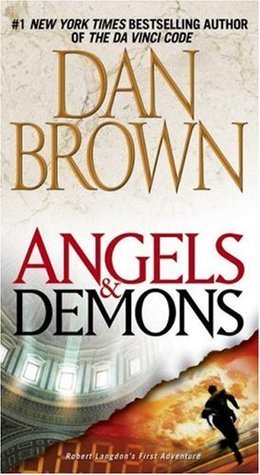 Angels & Demons
Angels & Demons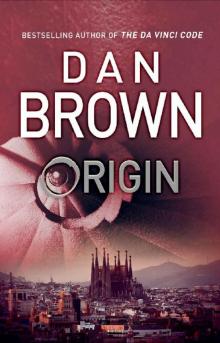 Origin
Origin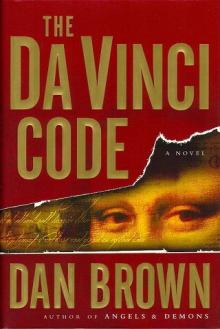 The Da Vinci Code
The Da Vinci Code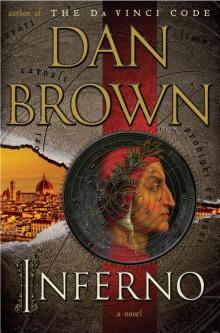 Inferno
Inferno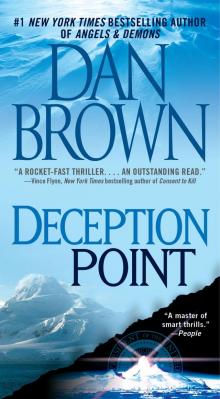 Deception Point
Deception Point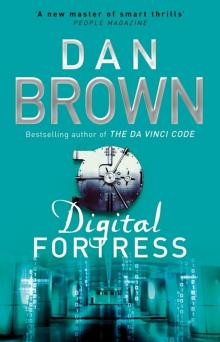 Digital Fortress
Digital Fortress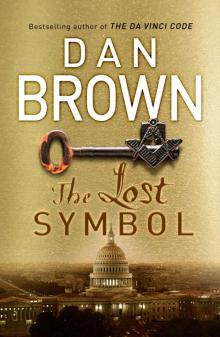 The Lost Symbol
The Lost Symbol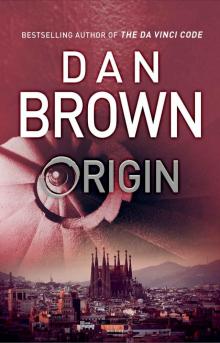 Origin: (Robert Langdon Book 5)
Origin: (Robert Langdon Book 5)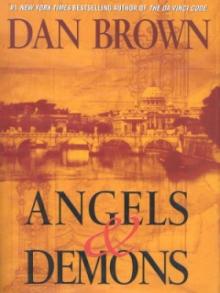 Angles & Demons
Angles & Demons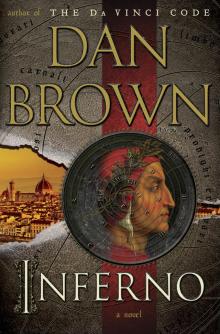 Inferno: A Novel
Inferno: A Novel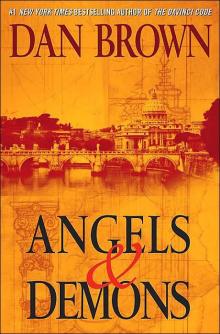 Angels & Demons rl-1
Angels & Demons rl-1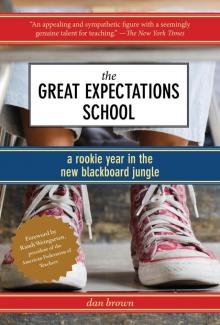 The Great Expectations School
The Great Expectations School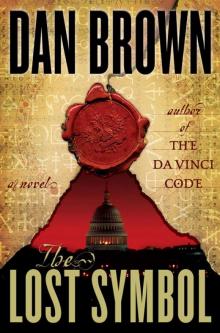 The Lost Symbol rl-3
The Lost Symbol rl-3 Angels and Demons
Angels and Demons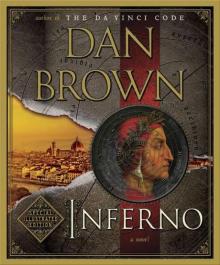 Inferno: Special Illustrated Edition: Featuring Robert Langdon
Inferno: Special Illustrated Edition: Featuring Robert Langdon